A Hub of Japanese Studies in China: Commemorative Symposium for the 30th Anniversary of the Beijing Center for Japanese Studies
Shin Katsuta, Naoko Sakamoto (Japanese Studies and Intellectual Exchange Department, Asia and Oceania Section)
In 1980, the "Training Center for Japanese Language Teachers," commonly called the "Ohira School," was established based on the 1979 agreement between then Prime Minister Masayoshi Ohira and then premier Hua Guofeng with the aim of fostering human resources to promote Japanese language and Japanese studies in China as well as cultural exchange. Five years later, through negotiations between the Japan Foundation and the Ministry of Education (MOE) of the Government of the People's Republic of China, the Ohira School, which had sent out approximately 600 graduates into the world, was reborn as the Beijing Center for Japanese Studies (hereinafter referred to as "the Center"), and until the present day has continued to function as one of the institutional hubs of Japanese education and research in China.
The Center is celebrating its 30th anniversary in 2015 and numerous events have been held so far to commemorate this occasion, culminating in the much-anticipated international symposium "Possibilities for Japanese Studies in Asia," the main event in the series of celebrations.
For this event held on October 24, first, a commemoration ceremony was held, followed by keynote speeches, talk sessions, and then an award ceremony for the Excellent Master's Theses in Japanese Studies in China. The event was attended not only by faculty and students of the Center, but also by teaching personnel who have provided research guidance to students in the past, as well as by numerous alumni who have graduated from the Center in the past 30 years. The long-awaited reunion prompted an outpouring of fond, nostalgic feelings.
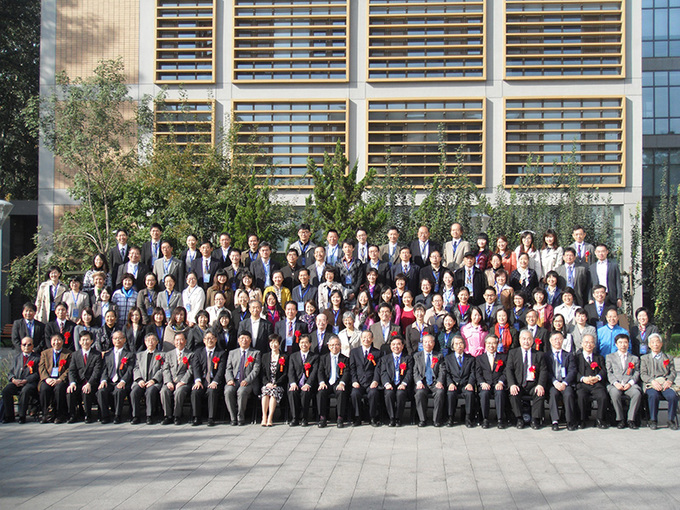
Group photograph of the participants in the commemoration ceremony
The first keynote speech was delivered by Nobuo Takeuchi, a professor emeritus at the University of Tokyo and former director of the Center from the Japanese side. Professor Takeuchi spoke passionately about the ambitions of then Prime Minister Masayoshi Ohira, who created the opportunity for establishing the Ohira School to promote friendship between Japan and China. His speech prompted an emotional response from the audience. Next, Professor Yan Shaodang of Peking University presented a historical review focused on Japan's ancient history, and explained that throughout the ages the relationship between Japan and China has been equal and friendly. In the talk session, the professors and former directors of the Center from the Japanese and Chinese sides were joined by alumni who have been active in various fields since graduation, including researchers, editors, presidents of travel agencies, public servants, etc. The alumni spoke of their memories of the Center and hopes for the future. One of the most memorable moments of the event was the introduction of three professors participating in the forum by a graduate of the Center. These professors had been dispatched as instructors by the Japan Foundation back in the days when the Center was still the Ohira School. We felt the passion of the graduates and teachers and their love for the Ohira School and the Center, which remains strong even today, 35 years after the establishment of the school. We couldn't help but be reminded of the hopeful atmosphere of those early days.
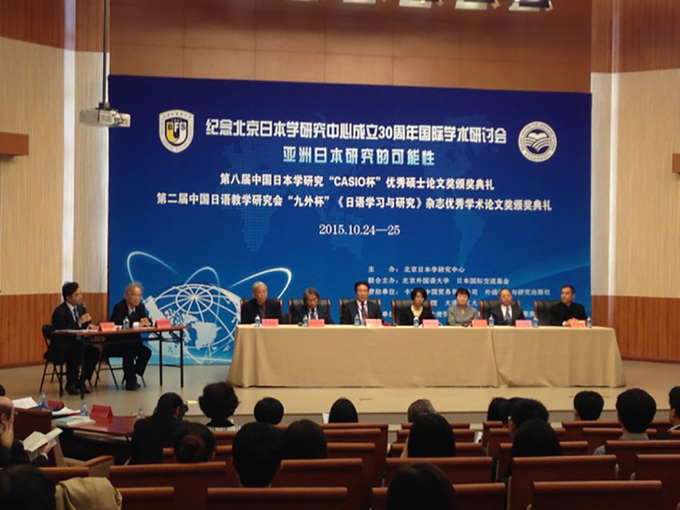
A talk session
The next day, researchers in Japanese Studies from China and abroad gathered in the Center and participated in theme-based discussions organized by field of specialty. At a group discussion on the theme "The Great East Japan Earthquake and the Metamorphosis of Japanese Society," in addition to the research presentations, a participant from the Mitsubishi Corporation, a company which is providing support for projects at the Center, introduced the company's reconstruction assistance activities in Tohoku, which enabled the audience to consider reconstruction assistance from a corporate perspective. Group discussions were held simultaneously in six specialized fields, and each classroom hosted presentations and lively dialogues.
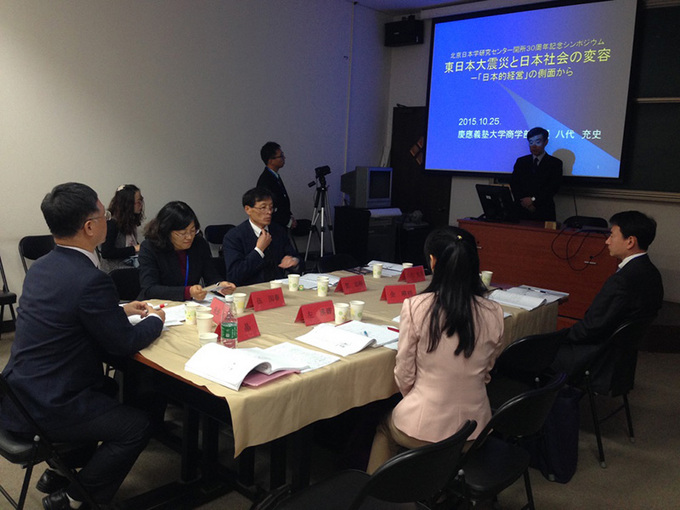
Group discussion "The Great East Japan Earthquake and the Metamorphosis of Japanese Society"
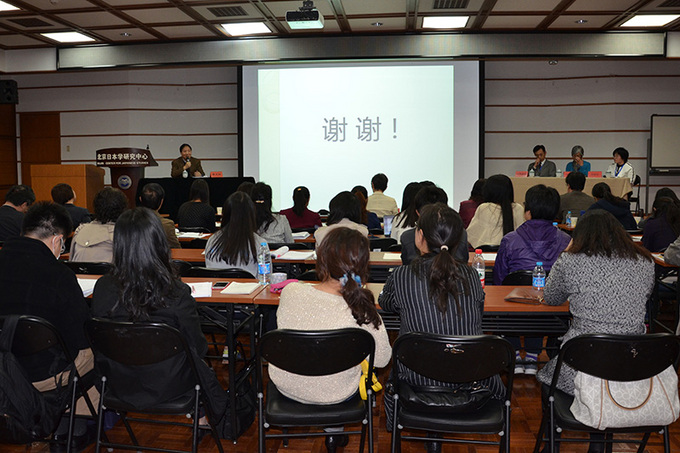
Group discussion "Japanese Language Education Studies Examined from Diverse Perspectives"
The two-day event was conducted mainly in Japanese. Even at group discussions, in which only Chinese researchers participated, all exchanges, including the actual discussion, were carried out in Japanese. Even in this aspect, we felt the solid results attained by the Center in its 30 years of work. On the sidelines of the symposium, a reunion was organized with the participation of several generations of alumni and professors dispatched from Japan. Long-lasting connections that go back 30 years were reaffirmed at this warm and cordial event.
The present director of the Center, Professor Xu Yiping used the Chinese proverb "It takes 10 years to grow trees but 100 years to nurture people" to make his point that it will take more time and effort to make the Center a reputable institution in the true sense of the word. As the Japan Foundation personnel overseeing the operations of the Center, we shall engage in initiatives from a long-term perspective to secure the further development of the Center as a hub of Japanese studies.
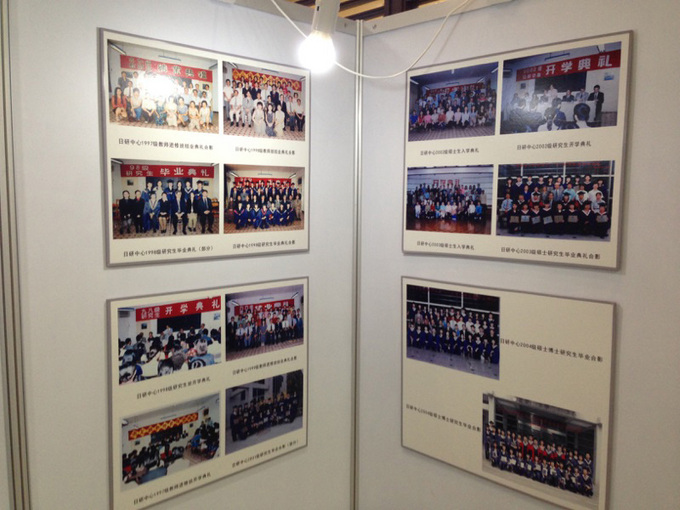
Exhibition of commemorative photos featuring generations of former students of the Center
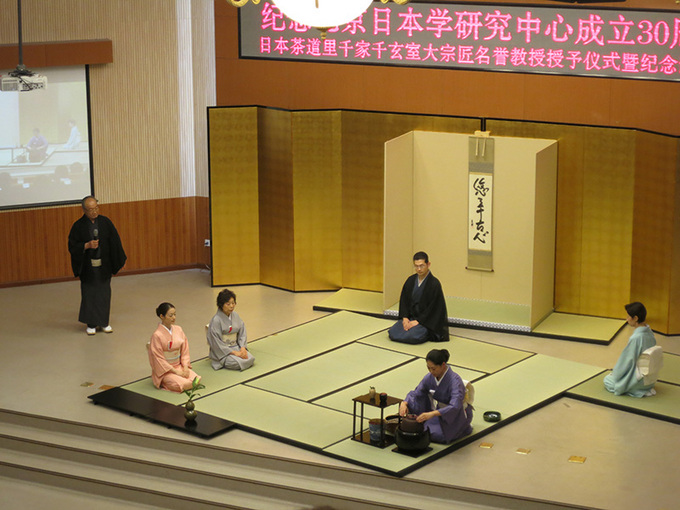
An Urasenke tea ceremony lecture and demonstration conducted in June as part of the 30th anniversary commemorative events
Back Issues
- 2023.4.10 The 49th Japan Found…
- 2023.3.28 JF's Initiatives for…
- 2023.1.27 Living Together with…
- 2022.11.16 Inner Diversity <…
- 2022.6.21 The 48th Japan Found…
- 2022.3.22 JF's Initiatives for…
- 2022.3.14 JF's Initiatives for…
- 2022.2.14 JF's Initiatives for…
- 2022.2. 4 JF's Initiatives for…
- 2021.12.13 JF's Initiatives for…

